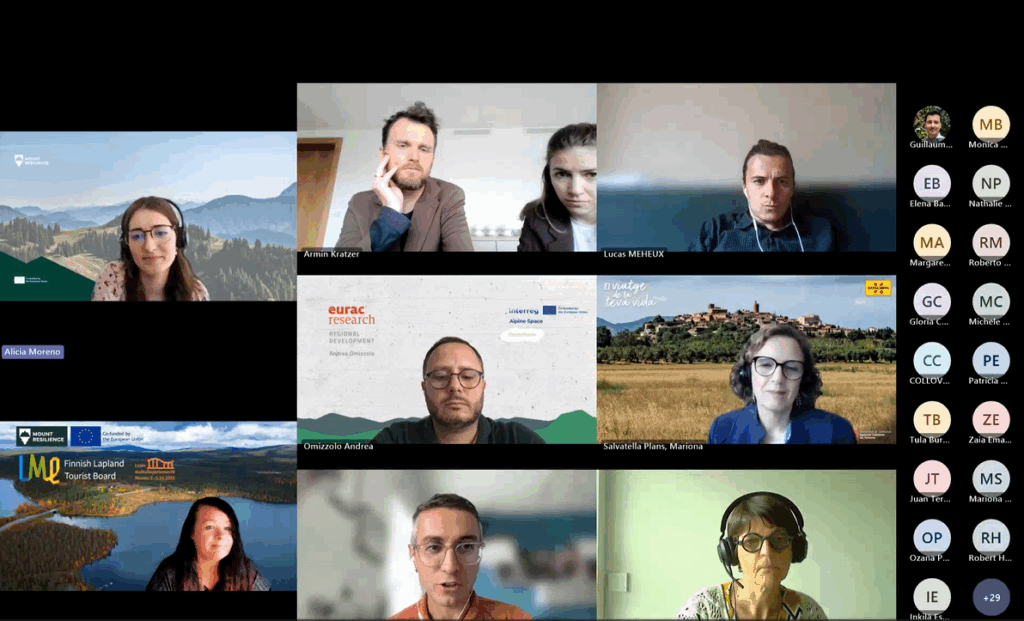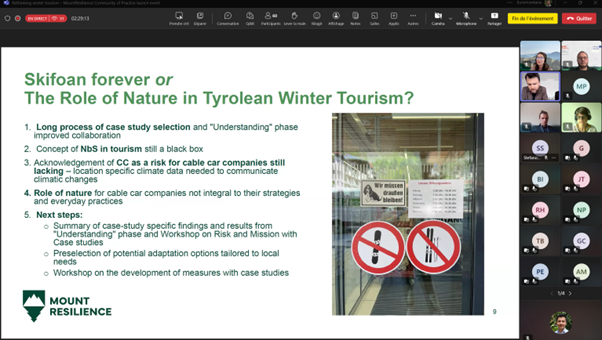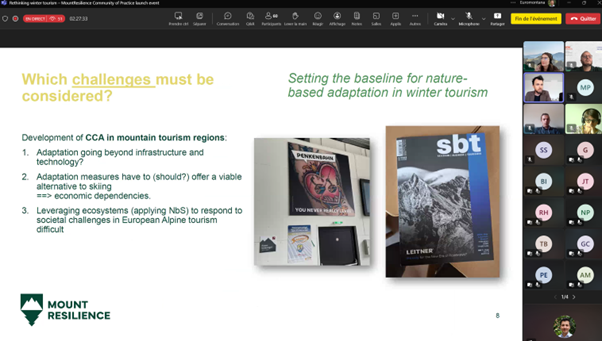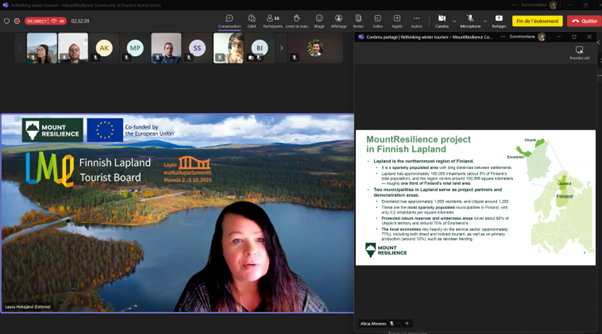On 5 June 2025, we were delighted to welcome over 60 participants to the launch event of the MountResilience Community of Practice (CoP) on Climate Change Adaptation, which focused specifically on winter tourism. Moderated by Euromontana and UNIMONT, the online event brought together a diverse range of stakeholders, including researchers, local authorities and tourism professionals, from across Europe to share experiences and reflect on how mountain winter tourism can adapt to a rapidly changing climate.

Why a Community of Practice?
The event kicked off by introducing the MountResilience project and explaining the vision behind our CoP. Our main goal is to create a vibrant space where experts and local stakeholders from across Europe can connect, share experiences, and contribute to important discussions about the future of mountain areas in climate policy. It’s about building a strong network for collective action!
Setting the scene

The following presentation set the stage with the findings from a recent study: ‘Climate change in mountain areas: meeting the challenge of adapting water management and tourism‘, which was commissioned by the French National Agency for Territorial Cohesion and conducted by Euromontana, Eureka 21 and ADTconsult. The presentation showcased inspiring strategies that are already being used in different EU countries to transform their tourism models. The presentation also focused on recommendations for the effective implementation of adaptation strategies in mountain regions.
Learning from inspiring projects
A core part of the event was the opportunity to hear directly from EU projects promoting the transition from snow-based tourism to alternative models through participatory approaches:
- PITON (Pyrenees Innovation Holistic Mountain Transition): Lucas Meheux (Agence des Pyrénées) and Mariona Salvatella (Catalan Tourism Board) explained how PITON is supporting adaptation to climate change in the Pyrenean region. Rather than focusing solely on ski resorts, they are reconnecting tourism with the wider local economy. In La Molina, for example, local groups are collaborating to develop their own solutions for long-term resilience.
- TranStat (Transitions to Sustainable Ski Tourism in the Alps of Tomorrow): Emmanuelle George (INRAE) shared insights from their work in Saint-Pierre-de-Chartreuse, a lower-altitude ski area facing severe climate and economic challenges. The TranStat project initiated a systemic diagnosis to understand these complex issues, supporting stakeholders in collaboratively defining a new, sustainable future for the resort.
- BeyondSnow (Enhancing the Resilience of Alpine Snow Tourism Destinations): Andrea Omizzolo (Eurac Research) presented the ‘Climate Resilience Tool’, which provides practical recommendations to support the adaptation of ski destinations to climate change. He also explored some of the co-designed transition strategies developed by the project’s pilots, as well as the specific actions that can be implemented in these regions to support them.
- MountResilience: Finally, MountResilience showcased its work in two very different regions: Tyrol in Austria and Lapland in Finland. Armin Kratzer (Standortagentur Innsbruck) and Elsa Vertruba (University of Innsbruck) explained the work they are doing with cable car company representatives from four Alpine ski resorts to develop adaptation strategies and address challenges such as integrating nature-based solutions and raising climate change awareness. Meanwhile, Laura Hokajärvi (Finnish Lapland Tourist Board) highlighted their work with tourism businesses, emphasising the need for training and practical tools for developing climate-resilient tourism offerings.

Workshop: Rethinking winter tourism in your region
The event concluded with an interactive workshop where participants shared their own regional challenges and ideas for moving adaptation forward.
Key barriers identified included limited funds for smaller destinations, and the influence of larger ski operators. Many small and medium-sized tourism businesses also struggle with limited time and resources for long-term planning. There’s also resistance to change, often from ingrained mindsets and traditional business models, especially when profitability concerns are high.
Participants stressed the need for:
- More accessible and relatable learning materials.
- Concrete examples of ski resorts successfully transitioning.
- Detailed information on local climate impacts.
- Guidance on alternative economic models.
- Support for communicating adaptation efforts to both locals and tourists.
As Laura Hokajärvi, representing our Lapland demo region, perfectly summarised: “Climate adaptation in tourism is not about resisting change. It’s about leading it wisely with purpose and resilience“.

Join our Community!
Are you a stakeholder working on climate change adaptation in mountains? We invite you to join the MountResilience Community of Practice. Click here to learn more and register!
Our next session, scheduled for September (date to be confirmed), will focus on knowledge platforms and tools to support climate adaptation, offering practical resources for your work.
Stay tuned for upcoming activities and opportunities to get involved!
You can see the slides of the presentation right here.
Merged_CoP_Rethinking-winter-tourism